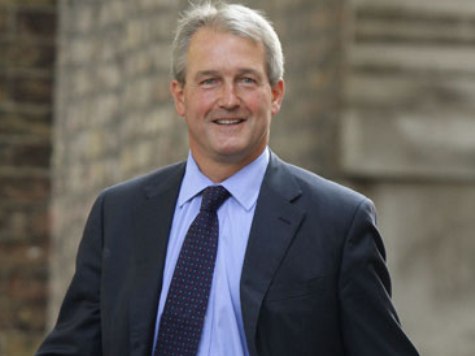Former Environment Minister Owen Paterson has called for Britain to leave the EU and negotiate a new free trade agreement with Europe.
Speaking at the Eurosceptic “Business for Britain” think tank, Mr Paterson told the audience that “As they [the EU] move away from us, we should grasp the opportunity to leave the current political arrangements and negotiate a new settlement” insisting that “we cannot follow the Eurozone into a more integrated political entity.”
In a speech which, aside from vague praise of David Cameron’s planned renegotiation and former Tory Prime Ministers, could have come straight from the lips of a UKIP politician, Mr Paterson launched a scathing attack on the “United States of Europe” and its architect, Jean Monnet.
“It is not so much that we are leaving the EU, as much as the political project of the EU has left us” he added, saying that far from an economic project the European Union was always designed to be a supranational government organisation.
“We owe a huge debt of gratitude to John Major and Norman Lamont for negotiating at Maastricht an opt-out from the euro,” he said. “Looking back, our decision not to join the Euro will be seen as the crucial moment in our relationship with the EU. Without that we would be caught in the same death spiral that is now dragging down the entire Eurozone economy.”
And he criticised federalist politicians and groups who had used scaremongering to say that the UK would lose influence and jobs should it leave.
“To suggest that leaving the EU would put at risk three million jobs attributed to UK exports to the EU is puerile because we will continue to export to the Single Market. The EU does not deliver jobs. It is the Single Market comprising the 31-member EEA which delivers.”
He went on: “We are told that being outside the EU would significantly diminish our influence by removing ourselves from the negotiating table of the world’s largest trading bloc. Nothing could, in fact, be further from the truth,” he said.
“Decision-making takes place at a global level through a variety of bodies and regulations. And we do not have seats at these “top tables” as we have handed power to the European Commission to represent us along with 27 other Member States. On these global councils, we have one twenty-eighth of one seat.”
The former minister highlighted his own experiences of working within EU rules when trying to run a government department, in particular the cost of the Common Agricultural Policy.
“The cost of membership has risen by 200 percent in the last decade during which our economy has grown by only 14 percent,” he told listeners, saying that the “bungled” negotiations by Tony Blair for the “non-reforms of the CAP” had cost the Treasury an additional £10billion.
And he insisted that it was possible to remain part of the Single Market, which allows for easy trading between countries, without being “saddled with the EU as a political project.”
“Membership of the EEA (European Economic Area) allows full participation in the Single Market without being in the EU, as enjoyed by Norway, Iceland and Lichtenstein. Those such as the CBI, who confuse the memberships of the Single Market and the EU are making a basic error and misleading the British people,” he said.
And his criticism of the pro-EU organisation didn’t stop there, as he added:
“Self-selecting surveys of CBI members may suggest enthusiasm for the Brussels system. But when firms are objectively polled by outside professional pollsters, a very different picture emerges. A major survey commissioned earlier this year showed that, by 46 to 37 per cent, businesses believe that the regulatory costs of the EU currently outweigh the benefits of membership.”
But he delivered a warning to organisations and political movements who, like him, wanted Britain to have independence from Brussels, saying that “the public will never fully commit to the independence they most likely want unless we can show that a smooth, orderly transition is possible.”
“The answer to this is to invoke Article 50 of the Lisbon Treaty,” he insisted.
“It is the only legally binding mechanism that we can use to require the rest of the EU to enter formal negotiations with us, on setting out a new relationship. It allows two years for negotiations, so there would still be time for a referendum in 2017. This would now be on the outcome of the talks, when the details of the settlement would be known.”
Political parties serious about wanting Britain to leave the EU should make a manifesto commitment to invoke Article 50 after a successful General Election, saying: “Such a commitment could be enormously attractive to uncommitted voters.”
Mr Paterson’s own conclusions were that the “Norway option”, one often used by Labour and the Lib Dems as an example of a country which pays but has no influence, was the best option.
But Paterson dismissed these examples, pointing out that “Norway has more influence in international decision-making than we do as an EU Member State.”
“Using the EEA ensures full access to the Single Market and provides immediate cover for leaving the political arrangements of the EU.”
His speech today will be welcomed by those on the right of the Conservative Party who will say it shows that the Tories are the only party who can seriously deliver for those who want a new relationship with Brussels.
But it will also mean the scratching of old scars as the divisions between the party are highlighted and concerns over the continued rise of UKIP plays on their mind.

COMMENTS
Please let us know if you're having issues with commenting.